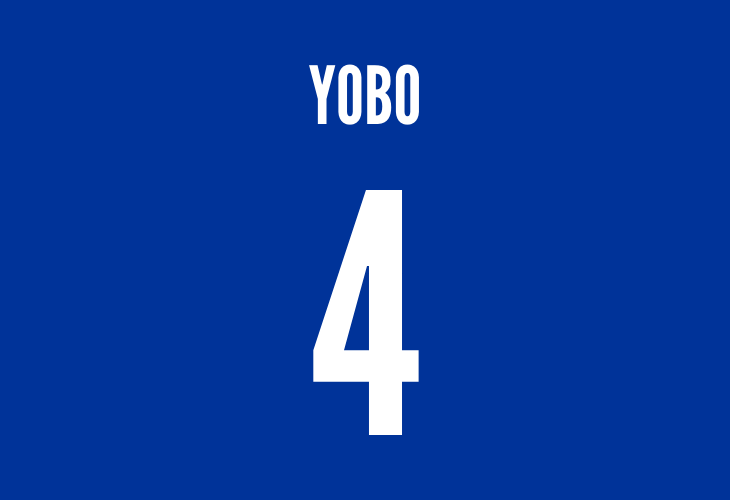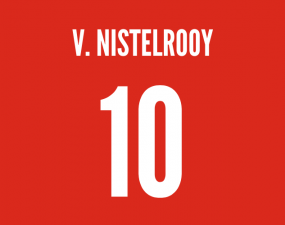Player Profile: Joseph Yobo
Date of Birth: 6/9/1980
Height: 1.88 m
Position: Centre-back
National Team: Nigeria
International Caps: 101
International Goals: 7
Club Career
Joseph Yobo may not have been the best African footballer to emerge from the continent in the late 90s or 00s. But the centre-back was one of the earliest African successes in the Premier League, and his career paved the way for more youngsters from the continent to make their mark in England.
Yobo was born in Nigeria and, like so many African footballers, left his home when he was just 18 to try his luck in Europe. His destination was Belgium where he signed up for Standard Liege. It was not until 2000 that Yobo made his debut and he immediately solidified his position in the first team, making 46 appearances in his debut year. This caught the interest of clubs across Europe and soon, Yobo was off to French giants Marseille.
His time at Marseille did not go as well as planned, though. Yobo was soon loaned off to Spanish club Tenerife and then, upon his return, sent out on loan to English side Everton. It was here though that Yobo finally began to flourish. He was the first signing that new Everton manager David Moyes made and it would prove to be a long and fruitful association for both manager and player.
Yobo made 26 appearances for Everton on loan, and his performances were impressive enough for the club to sign him on a permanent basis. It took a while before Everton and Marseille agreed on a fee, which was complicated further by Yobo falling out with his agent during this time. But before long, the Nigerian was donning the Royal Blue again.
In his early days at Everton, Moyes played Yobo as a right-back. He performed well in this position, but it was soon apparent that the big Nigerian was a natural central defender. His first season as a permanent Everton player saw him play 31 times and score twice. Despite his young age – he was still only 23 – Yobo had the composure of a much older player and earned his manager’s trust.
The 2004-05 season was a special one for Yobo as he kept his regular place in the Everton defence, helping them to a fourth-place finish in the league and Champions League qualification. The season itself had started on shaky ground for Yobo with reports circulating that he was looking to leave the Toffees for a bigger club. He would later rubbish these reports but admit that the sale of Wayne Rooney to Manchester United in the summer had created doubts in his mind as to what Everton’s ambitions were. But he put aside all that, playing a stellar role in Everton’s best season in the Premier League.
Two years later, Yobo had his best year yet for the Blues playing every minute of every game of the 2006-07 Premier League season. In the process, he helped Everton to a solid sixth place. That was also the season in which he broke the record for most appearances by an overseas player. This record would go on to stand for another five years. Yobo’s stellar displays that season saw him being linked with a move to Arsenal but he ended all speculation by signing a new four-year contract.
Things though soon turned sour for Yobo at Goodison Park with the arrival of Sylvain Distin, Phil Jagielka, and later, John Heitinga. He struggled to nail down a starting spot, and the high profile errors had begun to creep into his game did not help. One notable example was an own goal that he scored against arch-rivals Liverpool in the Merseyside derby in 2009. The 2009-10 season saw him make just 17 appearances in the league – the lowest since he joined Everton seven years prior. The writing was on the wall, and Yobo soon departed for pastures new.
The Nigerian initially moved to Turkish giants Fenerbahce on loan in the summer. His performances for the side were impressive enough for them to first extend his loan by another year and then sign him permanently on a three-year contract. Yobo tasted much success with Fenerbahce, winning the Turkish Super League in 2010-11 and the Turkish Cup twice, in 2012 and 2013.
Yobo had one final stint in England, coming back on loan to Norwich in 2014 with the hope of securing a permanent deal. But injuries meant that he made only 8 appearances and was not offered a contract at the end of his stay. Despite not finding a club, Yobo battled to get fit for the next two years, before finally announcing his retirement from football in 2016.
International Career
Joseph Yobo had a highly successful career with Nigeria, earning a century of caps for the Super Eagles. He first came to the fore during the 1999 World Youth Championships where he was part of the Nigeria team that made the quarters.
He made his debut for the senior team in 2001, and by the time the African Cup of Nations came around early the next year, he had established himself in the Nigerian defence. Yobo also made the squad for the 2002 World Cup. His most memorable moment of the tournament came when he assisted a consolation goal against Sweden.
Over the years, Yobo became one of the first names on the team sheet for the Super Eagles. By 2010, he had assumed the captaincy and led Nigeria at the 2010 World Cup, the first to be held in Africa. However, he would not taste success with the national team until later in his career.
In 2013, Nigeria won the African Cup of Nations with Yobo in their ranks. He only had a minor part to play in the final but managed to lift the trophy on his sixth attempt.
Yobo had one final hurrah with the national team, making the Nigeria squad for the 2014 World Cup and leading the team out in an impressive win against Bosnia. He announced his international retirement after the World Cup.
Where is Joseph Yobo now?
After his retirement, Yobo started focusing on coaching and in 2020 he was appointed as the assistant coach of the Nigerian national team.
Yobo is also a philanthropist, running a foundation for underprivileged kids in Nigeria and also runs soccer academies for talented kids in Nigeria.
Did you know?
– Yobo is deeply religious and it was widely reported that he had gone to an evangelical pastor in his home country for prayers after he sustained a serious injury in 2010.
– He is a traditional chief of his tribe, having the title conferred on him during a ceremony in 2016.
– Yobo’s elder brother Albert was a footballer too. He represented Nigeria as well as several European clubs including AJ Auxerre and FC Zwolle.
– His younger brother Norum was once kidnapped and being held for ransom before eventually being released.




